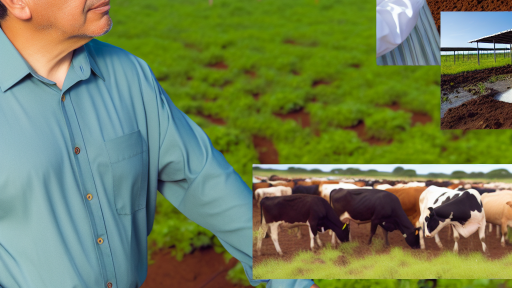Understanding Ethical Farming
Definition of Ethical Farming
Ethical farming prioritizes the welfare of animals, workers, and the environment.
It focuses on sustainable practices that ensure responsible land use.
Additionally, it aims to produce healthy food for all communities.
Core Principles of Ethical Farming
Transparency is a vital component of ethical farming practices.
Farmers must openly share their methods with consumers.
Fair treatment of all workers is crucial to maintain ethical standards.
Moreover, they should receive fair wages and safe working conditions.
Environmental Stewardship
Ethical farming promotes responsible environmental management.
This includes reducing pesticide use to protect biodiversity.
Additionally, it encourages practices that conserve water and soil health.
Farmers work to minimize their carbon footprint through innovative techniques.
Community Engagement
Ethical farming fosters strong community ties and support networks.
Farmers often engage with local consumers to understand their needs.
Collaboration with local organizations strengthens community initiatives.
Animal Welfare
Respecting animal welfare is a cornerstone of ethical farming.
Transform Your Agribusiness
Unlock your farm's potential with expert advice tailored to your needs. Get actionable steps that drive real results.
Get StartedFarmers must provide humane living conditions for all animals.
Furthermore, ethical farmers avoid using growth hormones and antibiotics.
This approach ensures healthier animals and better quality products.
The Importance of Ethical Farming in Sustainable Communities
Promoting Social Responsibility
Ethical farming nurtures social responsibility among farmers.
It encourages transparency in food production.
Moreover, it cultivates trust between producers and consumers.
This trust is critical for community resilience.
Environmental Stewardship
Ethical practices protect natural resources.
Farmers utilize sustainable methods to enhance soil health.
Additionally, they reduce chemical inputs in farming.
This contributes to cleaner water supplies and healthier ecosystems.
Economic Benefits for Local Communities
Ethical farming supports local economies.
It often leads to the creation of local jobs.
Furthermore, it encourages the development of local markets.
Consumers benefit from fresher, high-quality produce.
Empowering Farmers
Ethical farming empowers small-scale farmers.
It promotes fair trade practices and better wages.
As a result, farmers gain more control over their livelihoods.
This empowerment fosters community cohesion.
Encouraging Healthy Eating
Ethical farming promotes access to nutritious food.
It emphasizes the importance of organic and locally-sourced produce.
Consequently, communities become healthier overall.
Healthy eating habits help prevent chronic diseases.
Building Community Connections
Engaging in ethical farming strengthens community bonds.
Showcase Your Farming Business
Publish your professional farming services profile on our blog for a one-time fee of $200 and reach a dedicated audience of farmers and agribusiness owners.
Publish Your ProfileFarmers often collaborate with local organizations.
This collaboration leads to community events and education programs.
Such initiatives foster a sense of belonging among residents.
Key Practices of Ethical Farming
Organic Methods
Organic farming practices emphasize sustainability and environmental health.
These methods avoid synthetic chemicals and genetically modified organisms.
Farmers use natural fertilizers, such as compost and manure, to enrich soil.
Crop rotation enhances soil biodiversity and prevents pest issues.
This approach also prioritizes local seed varieties that adapt well to the region.
Farmers often maintain diverse farms to promote ecological balance.
Animal Welfare
Ethical farming places a strong emphasis on animal welfare.
Farmers ensure that animals have ample space to roam and enjoy natural behaviors.
Access to outdoor areas is critical for the mental and physical health of livestock.
Allowing animals to graze naturally provides them with better nutrition.
Furthermore, ethical farmers follow humane practices in breeding and slaughter.
This commitment fosters a sense of responsibility towards all living beings.
Soil Health
Healthy soil is the foundation of sustainable farming practices.
Farmers focus on improving soil structure and fertility through various techniques.
Cover crops protect soil from erosion while adding nutrients when decomposed.
Additionally, minimal tillage practices help preserve soil microbiomes.
Regular testing allows farmers to monitor soil health effectively.
Ultimately, healthy soil leads to stronger crops and reduced reliance on fertilizers.
Find Out More: Sustainable Soil Management Practices
Community Engagement: Building Awareness and Support for Ethical Farming
Understanding Ethical Farming
Ethical farming prioritizes humane treatment of animals.
It focuses on environmental sustainability and community well-being.
More importantly, it promotes fair labor practices among workers.
Building Community Awareness
Initiate workshops to educate local residents about ethical farming.
Involve local farmers in discussions about sustainable practices.
Create informational brochures highlighting the benefits of ethical farming.
Utilize social media to spread awareness and engage the community.
Encouraging Local Partnerships
Form alliances with local businesses to support ethical farms.
Host community events featuring produce from ethical farms.
Collaborate with schools to teach students about food sources.
Incorporate ethical farming practices into community gardens.
Creating Supportive Policies
Advocate for local legislation that supports ethical farming initiatives.
Encourage policymakers to provide incentives for sustainable practices.
Engage with community leaders to promote ethical sourcing policies.
Fostering a Sense of Community
Invite community members to participate in volunteer days on farms.
Organize farm-to-table events to connect consumers with producers.
Encourage families to visit local farms and learn about their processes.
Measuring Impact
Conduct surveys to understand community attitudes toward ethical farming.
Showcase Your Farming Business
Publish your professional farming services profile on our blog for a one-time fee of $200 and reach a dedicated audience of farmers and agribusiness owners.
Publish Your ProfileMonitor the increase in support for local ethical farms.
Share success stories to further inspire community involvement.
Learn More: Starting Your Own Community Supported Agriculture
Role of Local Governments and Policies in Promoting Ethical Farming
Importance of Local Government Support
Local governments play a vital role in fostering ethical farming practices.
They create policies that encourage sustainable agriculture.
Additionally, they offer financial incentives to farmers adopting ethical practices.
Moreover, local governments facilitate educational programs about sustainable methods.
Policy Development and Implementation
Effective policies require thorough research and stakeholder input.
Local governments must assess the needs of their communities.
Engaging with local farmers can inspire innovative solutions.
Subsequently, they can draft policies tailored to local conditions.
Collaborative Initiatives
Collaboration among local governments, farmers, and NGOs enhances ethical farming efforts.
Joint programs can address challenges such as climate change and resource management.
Such partnerships facilitate knowledge sharing and resource pooling.
They also promote the adoption of best practices and successful strategies.
Monitoring and Evaluation
Monitoring ethical farming practices is essential for accountability.
Local governments should establish clear metrics for success.
Regular evaluation of policies ensures they remain effective over time.
This feedback loop allows for continuous improvement in practices.
Community Engagement and Education
Local governments can drive community engagement in ethical farming.
They should organize workshops and public forums to discuss agricultural issues.
Encouraging community input builds trust and a sense of ownership.
Education initiatives raise awareness about the benefits of ethical farming.
Promoting Local Markets
Supporting local markets can drive demand for ethically produced goods.
Local governments can create farmer’s markets and community-supported agriculture programs.
These initiatives help connect consumers with local farmers.
Furthermore, they enhance food security and promote equitable access to food.
Gain More Insights: Creating a Subscription Box for Farm Products

Collaborative Efforts
Partnerships Between Farmers and NGOs
Farmers and NGOs can achieve significant progress through collaboration.
This partnership allows for shared resources and knowledge exchange.
Local NGOs often support farmers by providing training sessions.
Training focuses on sustainable practices and ethical farming techniques.
Moreover, NGOs can help farmers access financial assistance.
Such financial support encourages the adoption of eco-friendly practices.
Examples include grants for purchasing organic seeds or equipment.
Additionally, NGOs facilitate connections to larger markets.
Thus, farmers can sell their products at fair prices.
Engaging Consumers in Ethical Farming
Consumers play a vital role in promoting ethical farming.
Awareness campaigns educate the public about sustainable choices.
Farm-to-table initiatives enhance connections between farmers and consumers.
Showcase Your Farming Business
Publish your professional farming services profile on our blog for a one-time fee of $200 and reach a dedicated audience of farmers and agribusiness owners.
Publish Your ProfileThese initiatives also encourage consumers to support local farms.
Moreover, consumers can participate in community-supported agriculture (CSA) programs.
Through CSAs, they directly invest in local farms.
This investment ensures the financial sustainability of ethical practices.
Furthermore, consumer demand for organic products drives farmers to adopt sustainable methods.
Creating Community Networks
Building strong community networks enhances collaborative efforts.
Local farming cooperatives provide shared resources for farmers.
These cooperatives can offer bulk purchasing discounts on supplies.
They also facilitate joint marketing efforts for greater visibility.
Additionally, community gatherings encourage networking and idea sharing.
Farmers, NGOs, and consumers can discuss challenges and solutions together.
These discussions foster a sense of community ownership over local food systems.
Ultimately, robust networks strengthen the ethical agriculture movement.
Find Out More: Ethical Animal Farming Challenges
Success Stories: Case Studies of Communities Thriving with Ethical Farming
Community in Green Valley
The community in Green Valley has embraced ethical farming practices passionately.
Farmers transitioned to organic methods, boosting their crop yields.
They reduced chemical usage significantly, enhancing soil health.
As a result, they attracted more local customers who value sustainability.
The community organized workshops on ethical farming, creating shared knowledge.
This initiative fostered a strong support network among local farmers.
Beechwood Cooperative
Beechwood Cooperative implemented a community-supported agriculture (CSA) model.
Members invest in local farms, receiving fresh produce weekly.
This model creates a direct connection between farmers and consumers.
Furthermore, it ensures that farmers receive fair compensation.
The cooperative focuses on education, teaching members about sustainable practices.
This approach has empowered the community to engage with their local food system.
Sunny Meadows Farm prides itself on holistic farming methods.
The farm integrates livestock with crop production, enhancing biodiversity.
Rotational grazing practices help regenerate land sustainably.
As a result, they produce high-quality meat and vegetables.
They also host farm tours, educating visitors about ethical farming.
This transparency builds trust and fosters community relations.
Bright Futures Initiative
The Bright Futures Initiative focuses on urban ethical farming.
They transformed vacant lots into thriving community gardens.
This project increases access to fresh vegetables in underserved neighborhoods.
Community members participate in growing and maintaining the gardens.
Additionally, they run programs teaching gardening skills to local youth.
This involvement strengthens ties within the community and promotes stewardship.
Harvest Hope Project
The Harvest Hope Project addresses food insecurity through ethical farming.
They partner with local farms to provide fresh produce to families in need.
Showcase Your Farming Business
Publish your professional farming services profile on our blog for a one-time fee of $200 and reach a dedicated audience of farmers and agribusiness owners.
Publish Your ProfileThis initiative distributes food through local food banks and community centers.
Furthermore, they organize workshops focused on nutrition and cooking.
They empower participants to make healthier food choices.
The project highlights the importance of community well-being and support.
Challenges and Solutions in Implementing Ethical Farming Practices
Understanding the Barriers
Many farmers face financial constraints when considering ethical practices.
Traditional methods often prioritize maximum yield over sustainability.
Access to resources can be limited in rural communities.
Additionally, a lack of education on ethical techniques exists.
Addressing Financial Constraints
Cooperatives can help farmers by sharing resources and knowledge.
Accessing grants and subsidies encourages the adoption of ethical practices.
Financial literacy programs enhance farmers’ ability to manage funds.
Community-supported agriculture offers financial backing through local consumers.
Promoting Sustainable Techniques
Workshops in communities educate farmers on ethical methods.
Demonstration farms provide hands-on learning experiences.
Mentorship programs connect experienced farmers with novices.
Online resources and platforms can share innovative practices widely.
Improving Resource Access
Establishing local supply chains ensures availability of sustainable inputs.
Farmers’ markets create opportunities for local producers to sell goods.
Partnerships with universities can enhance research and development.
Access to technology helps in monitoring sustainable farming practices.
Enhancing Community Awareness
Community involvement fosters a culture of ethical farming.
Local campaigns can raise awareness about the benefits of ethical practices.
Schools can incorporate sustainability into their curriculums.
Social media platforms can spread success stories and inspire others.
Building Strong Networks
Networking among farmers fosters collaboration and shared goals.
Joining local organizations can amplify voices advocating for ethical farming.
Participating in agricultural fairs promotes community engagement.
Collaboration with non-profits helps raise funds for ethical initiatives.
Additional Resources
The History of the Farm to Table Movement – Advanced Biotech
Farm to Fork- Making Ethical Food Choices in Ireland | Crystal Travel




